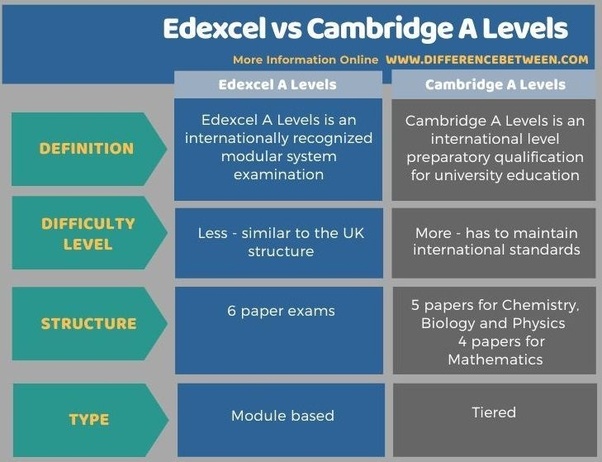
What Is The Difference Between Edexcel and Cambridge A Levels
An introduction to What Is The Difference Between Edexcel and Cambridge A Levels
Name: Own Teacher
Email: info@ownteacher.com
Created At: 17-11-2023
Edexcel and Cambridge A Levels refer to two distinct examination boards offering the Advanced Level (A Level) qualification, but they have some differences:
Exam Boards:
- Edexcel: Operated by Pearson, a UK-based education company.
- Cambridge: Administered by Cambridge Assessment, a department of the University of Cambridge, UK.
International vs. UK Focus:
- Edexcel: Primarily UK-focused but offers international qualifications.
- Cambridge: Known for its international focus, providing qualifications recognized globally.
Assessment Methodologies:
- Edexcel: Uses a variety of assessment methods, including exams and coursework.
- Cambridge: Emphasizes a comprehensive exam-based assessment approach.
Grading Systems:
- Edexcel: Utilizes letter grades (A*-U) for A Levels.
- Cambridge: Typically employs a numerical grading system (1-9) for A Levels.
Subject Offerings:
- Both boards offer a wide range of subjects, but specific subject availability may vary.
Global Recognition:
- Edexcel: Recognized internationally, especially in Commonwealth countries.
- Cambridge: Well-established globally with widespread recognition.
Examination Structure:
- The structure of exams, question formats, and assessment criteria may differ between the two boards.
Curriculum Alignment:
- While both follow the UK A Level curriculum, there may be variations in specific content and teaching approaches.
Resource Materials:
- Each board may provide different textbooks, teaching resources, and support materials for educators and students.
Administrative Practices:
- Administrative processes, exam schedules, and registration procedures may vary between Edexcel and Cambridge.
When choosing between Edexcel and Cambridge A Levels, students and institutions often consider factors such as global recognition, assessment preferences, and the specific subjects offered. Both qualifications are widely accepted by universities and employers, but the choice may depend on individual preferences and educational goals.
Comment List
Leave a Comment.



